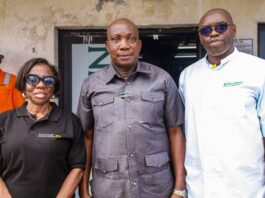Save the Children International Launches Benue State IDPs Policy
CHIGOZIE AMADI
Save the Children International (SCI), in collaboration with the Benue State Government, has launched the Internally Displaced Persons (IDPs) policy in the state.
The SCI while commending the state government for the domestication of the policy urged them to translate the policy into concrete results, safer shelters, restored livelihoods, access to education, and protection services for every displaced child and family in the state.
The Deputy Country Director, Save the Children International, Jane Mbagi Mutua, gave the charge during the launch at Government House Makurdi.
She appealed to government agencies, development partners, civil society, and community leaders to work together to ensure that the policy moves beyond paper to action reminding that the children and families of the State are counting on them to make the policy a reality through full implementation, adequate resourcing, and continuous monitoring.
Mutua said “Save the Children is pleased to have supported the development of this policy through technical and financial assistance and remains committed to working with the government and communities till every Nigerian child can learn in safety and is protected.
“In Benue State, Save the Children is supporting IDPs with cash assistance to enable them meet urgent needs and begin rebuilding their livelihoods, as WASH and child protection services.
“In addition, Save the Children is also working closely with communities to reduce the risk of displacement due to flooding through the Flood Anticipation Capacity Enhancement Project and the Strengthening Anticipatory Action in Nigeria initiative”.
The Country Deputy Director noted that since the founding of the organisation over 100 years ago, Save the Children has been committed to ensuring that every child’s rights are recognized and protected, saying “We listen to children, their families, and communities, and partner with governments and international organisations to champion children’s rights.”
Launching the policy, Benue State Governor, Rev. Fr. Hyacinth Alia, noted the policy is not just a document but is a social contract between government, partners, and displaced communities to place those affected at the center of every intervention.
The governor who spoke through his deputy, Barr. Sam Odeh, acknowledged the peculiarities of implementation in the state policy environment, maintained that while international partners are rightly non-political, project design must still recognize the political and social dynamics of the communities it serves.
“In Benue, we spread interventions across our three senatorial zones A, B, and C. Though they share similar challenges, inclusion and balance are essential. I urge the ministry and our partners to keep this reality in mind during design and implementation.
“I call on all stakeholders, ministries, agencies, civil society, the private sector, and community leaders to rally behind this policy. Coordinate through the Ministry of Humanitarian Affairs, the Durable Solutions Taskforce, and the SDGs Directorate. Let us ensure responses, whether emergency or long-term, are streamlined, inclusive, and effective.
“To our displaced brothers and sisters, hear me clearly: you are not forgotten, and you are not alone. Your resilience inspires us, and your future is at the heart of this policy and our Durable Solutions Action Plan”, Alia stated.








